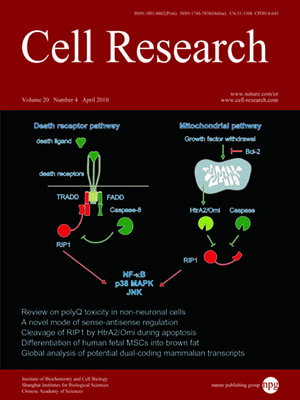
Volume 20, No 4, Apr 2010
ISSN: 1001-0602
EISSN: 1748-7838 2018
impact factor 17.848*
(Clarivate Analytics, 2019)
Volume 20 Issue 4, April 2010: 458-469
ORIGINAL ARTICLES
BCL2 inhibits cell adhesion, spreading, and motility by enhancing actin polymerization
Hengning Ke1, Vandy I Parron1, Jeff Reece2, Jennifer Y Zhang4, Steven K Akiyama3 and John E French1
1Laboratory of Molecular Toxicology, National Institute of Environmental Health Sciences, Research Triangle Park, NC 27709, USA
2Laboratory of Signal Transduction, National Institute of Environmental Health Sciences, 111, TW Alexander Dr. MD K2-08, Research Triangle Park, NC 27709-2233, USA
3Laboratory of Molecular Carcinogenesis, National Institute of Environmental Health Sciences, Research Triangle Park, NC 27709, USA
4Department of Dermatology, Duke University Medical Center, Durham, NC 27710, USA
Correspondence: John E French, Hengning Ke,(french@niehs.nih.gov; hk71@notes.duke.edu)
BCL2 is best known as a multifunctional anti-apoptotic protein. However, little is known about its role in cell-adhesive and motility events. Here, we show that BCL2 may play a role in the regulation of cell adhesion, spreading, and motility. When BCL2 was overexpressed in cultured murine and human cell lines, cell spreading, adhesion, and motility were impaired. Consistent with these results, the loss of Bcl2 resulted in higher motility observed in Bcl2-null mouse embryonic fibroblast (MEF) cells compared to wild type. The mechanism of BCL2 regulation of cell adhesion and motility may involve formation of a complex containing BCL2, actin, and gelsolin, which appears to functionally decrease the severing activity of gelsolin. We have observed that the lysate from MCF-7 and NIH3T3 cells that overexpressed BCL2 enhanced actin polymerization in cell-free in vitro assays. Confocal immunofluorescent localization of BCL2 and F-actin during spreading consistently showed that increased expression of BCL2 resulted in increased F-actin polymerization. Thus, the formation of BCL2 and gelsolin complexes (which possibly contain other proteins) appears to play a critical role in the regulation of cell adhesion and migration. Given the established correlation of cell motility with cancer metastasis, this result may explain why the expression of BCL2 in some tumor cell types reduces the potential for metastasis and is associated with improved patient prognosis.
BCL2 is best known as a multifunctional anti-apoptotic protein. However, little is known about its role in cell-adhesive and motility events. Here, we show that BCL2 may play a role in the regulation of cell adhesion, spreading, and motility. When BCL2 wa
FULL TEXT | PDF
Browse 2212


